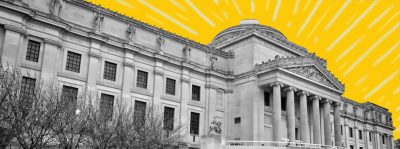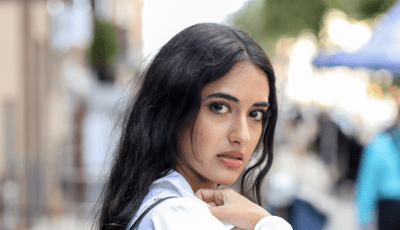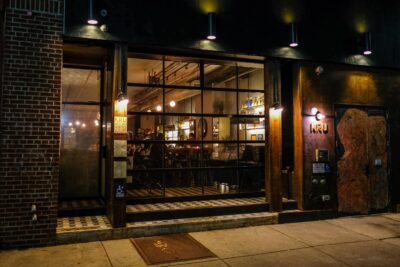Photo by Aday
How Michaël Brun Carried BAYO from Haitian Block Parties to Barclays Center
BAYO is set to make its arena debut at Barclays Center on Saturday, June 28, with more than 30 surprise guests
Should you scan his extensive production credits, you might not gather Michaël Brun had at one point aspired to be a pediatrician. Tens of millions of plays later, it’s hard to imagine he was fated for anything other than a headlining show at Barclays Center. That’s where you’ll find the Haitian producer and DJ on Saturday, June 28, serving as master of ceremonies for the latest installation of his long-running BAYO event series.
Born at a block party in Haiti and raised on stages across the globe, BAYO, which translates to “give” in Creole, has bloomed gorgeously over the nine years since it was founded into a singular celebration of the Caribbean’s enduring impact on modern music—not just how it sounds, but how it’s experienced. BAYO, like the borough itself, treats the block party as a sacred institution, hallowed ground for eyes, ears, sweat, footwork, and discovery. And Brun takes his curatorial role seriously. As the event series approaches a decade in rotation, the producer has showcased more than 100 artists through BAYO (he’ll add 30 more by the end of the weekend), earning the trust of audiences worldwide with line-ups that are announced only on the night of the event.
Ahead of the show, we caught up with Michaël Brun to discuss the unconventional show format, the familial and cultural origins of his career in music, and why the event belongs in Brooklyn. Hear his latest single below, grab a ticket for BAYO today, and scroll on for our conversation with the producer.
Is this your first time at Barclays?
It’s actually not my first time playing it, but it is my first headline show.
Oh wow. Does that add any pressure?
Yeah. I feel like it’s a statement, you know? And I want to make sure it has a really big impact on everything I’ve been building. This feels like an anniversary in a way. It’s about to be the tenth year of doing this concept of show. It started with like 20 people, and getting into Barclays, like, arena level, with 10,000-plus is wild.
Are you preparing something unique for the occasion?

Photo by Dimitrios Kambouris via Getty Images
Absolutely. This has been a year of prep. It’s a show. Like a legitimate front-to-back show that we really worked hard on with many elements. It’s a brand new stage. It’s a lot of new visuals. There’s a lot of moving parts. And if you’ve been to one before, you know, it’s block party vibes. It’s this atmosphere of like, you never know what’s going to happen or where the sound’s going to take you. But I think also when you’re in an arena, there’s this theatrical element. So we’ve just been working really hard with everyone, and doing our best to create these moments of social intimacy.
You’re local, right?
Yeah, I’ve been living here for seven years now. So this is like my backyard.
Does that bring an extra layer to this?
It’s such a cool feeling. I’ve been here for years now, and this has become my home. To be able to have a show of this caliber in such an amazing and special city. It’s exciting. It means a lot.
I mean, given the impact of the Caribbean diaspora here, and the city’s broader role in developing both the genres and cultures of house and electronic music, it feels like precisely the right place for a show like this.
I’m really happy you brought that up. Even outside of electronic music, if you want to go further into DJ culture in general, the idea of the modern-day DJ is, in many ways, Caribbean and Latin American immigrants that got to New York, that brought elements of what they were doing from back home.
From toasting to sound system culture, the whole playbook is essentially created here.
Yeah, it’s so wild. But that’s what I mean. To be a part of that lineage, of this cultural fusion of all of these different incredible places, all of these immigrant sounds is what makes America so special, what makes the city in particular such an amazing place. I really feel like it’s an honor. And I think being able to have a show that’s very authentically of my heritage is a huge privilege. And I know that the people who have been supporting since day one feel like the show is for them, too. It’s a shared community experience.
Speaking of heritage, your father was in a band called Skandal, and I had the pleasure of spending the morning looking up their EP and the three double-sided singles they put out. And, man—that stuff was crazy good.
Right? Yo. It was so sick. I’m going to see my dad tomorrow, so I can’t wait to tell him. He’s a legend. He influenced so many people not only Haiti, but in the Caribbean. I’m so happy you looked into that. My dad’s biggest influence at the time was Art of Noise. Like 90s atmospheric electronic. And then they listen to The Police for pop-inspired, Caribbean-influenced things, right? And then, of course, Kompa music, which is our traditional genre in Haiti. But yeah, they worked really hard on that, and even though they had really short careers, they had such a big impact on a lot of like genres coming from Haiti and the Caribbean. So I’m really honored, you know, that I’ve been able to learn from him and the things he’s done. Also, there’s something special for him at the show.
Was he your entryway into music?
Funny enough, I don’t really think so. It was subtle. Both my parents were musicians in a way. My mom played piano and violin, and my dad had this band. But then he wasn’t doing it. So music was definitely a part of my life, but it was always in the background because I was planning to be a doctor.
That’s quite a pivot.
That’s what I thought I was going to do until I was in college. I was going to be a pediatrician. But I started DJing as a hobby when I was 15. It was like something I loved, but I wasn’t planning on being in music. It was just something I loved doing. But I actually think that it was through DJing and electronic music and what I discovered online that made me feel like, “Oh, it’s this bedroom DJ thing that’s coming up. I think I can do that.”


Photo by Dimitrios Kambouris via Getty Images
What was the switch flip moment?
I mean, there’s a couple, but I think the very, very first thing I did in Haiti—I played my friend’s house party kind of vibe. And I got to meet my first real DJ. It was a Haitian DJ called Full Blast. He was a really nice mentor, basically, and he allowed me to work with what he had, and I feel like the theme in my life is I’ve had a lot of great mentors and support along the way, which allowed me to do what I’m doing.
And then the other one was when I signed my first record with Dirty South and Hardwell, who were two really big EDM DJs. And I got invited to Ultra Music Festival in Miami when I was still in college. Dirty brought me on stage, and we were in front of 10,000, or however many people, and it was crazy. Just getting to hear my song that I made in my bedroom, get signed by him, who was like one of my favorite DJs at that point, and then I get to see it live. I was like, “Oh my God, like I can do this. This is real.”
That’s beautiful, bro. The scale of that image is just huge in my brain. Is that something you’re trying to pass on to other artists with BAYO?
I think that’s definitely a part of what this whole thing is for me. I get to put on a lot of artists, and we’ve had over a hundred artists now over these last 10 years at different shows. So if you want to see who I’m excited about, you’ll see them on stage.
Sounds like a pretty full circle moment in a lot of ways.
Yeah, I mean, honestly, I’m just so proud to live in the city right now. I’m an immigrant here, and it’s been a privilege to get to grow so much of my artistic career in this city. I feel like the arts are such an important part of the future as well. So I think these kinds of moments can create more connected communities around things like music and around these kinds of events, because that to me is how I’ve been exposed to so many other cultures.
You had asked earlier if it’s my first time at Barclays. My first time at Barclays was actually with Maxwell. The second time I was opening for J Balvin. Getting to play with both of them just exposed me to so many sounds, and I feel like music has been a doorway to connecting for me. Now with BAYO, I want to continue the lineage. And, if you haven’t been to this kind of show, a Caribbean show, please, you’re invited. No matter what heritage, come. I think you’ll learn something and enjoy it.
You might also like 























